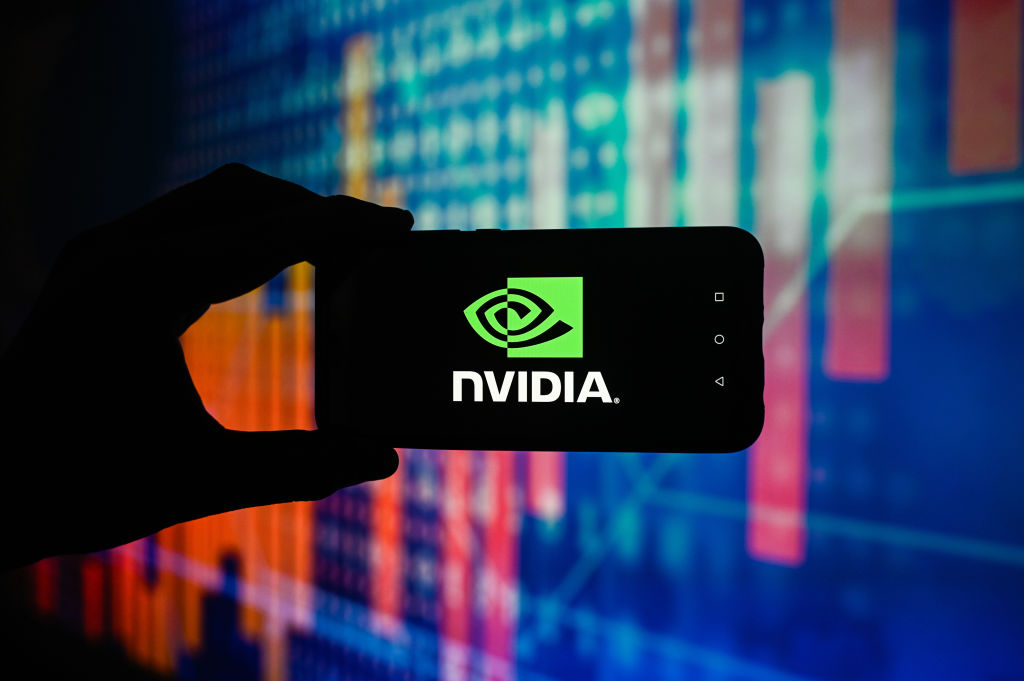3 ways to play the artificial intelligence boom
Artificial intelligence will play a huge role in many sectors. Look for a wider range of ways to profit.


Get the latest financial news, insights and expert analysis from our award-winning MoneyWeek team, to help you understand what really matters when it comes to your finances.
You are now subscribed
Your newsletter sign-up was successful
Want to add more newsletters?
Stocks related to artificial intelligence (AI) have been leading the market higher this year, with names such as Microsoft, Nvidia and Apple jumping between 33% and 218% year to date. These gains are reminiscent of the dotcom bubble in the late 1990s. I’m not entirely convinced we’re in a similar position, but we are certainly in a peculiar market.
Nvidia, the big daddy of AI, is trading at 232 times trailing earnings. That’s some multiple to “grow into”. But one stock does not make a bubble. As analysts at ETF firm WisdomTree point out, a composite tech index that includes stocks from different sub-sectors is trading at below 30 times forecast earnings today, compared with 55 times in the 1990s. That’s not cheap, but it is not a bubble.
Investment theory suggests that the more diversified you are, the better the risk levels and the more opportunity to capture what’s called market breadth. However, the AI buzz hasn’t been that broad or diversified – it’s really just about a handful of stocks. What’s more, I would argue that most investors who put money to work in AI-related stocks are not long-term investors. They are chasing momentum, which is a respectable strategy until it falls over.
Try 6 free issues of MoneyWeek today
Get unparalleled financial insight, analysis and expert opinion you can profit from.

Sign up to Money Morning
Don't miss the latest investment and personal finances news, market analysis, plus money-saving tips with our free twice-daily newsletter
Don't miss the latest investment and personal finances news, market analysis, plus money-saving tips with our free twice-daily newsletter
If you believe – as I do – that AI will have a huge influence over many sectors, then frankly AI falls away into the corporate noise – the businesses that use it smartly will probably be the very biggest tech-enabled firms with access to deep wells of capital. They might not be clever AI start-ups or even the giants such as Nvidia or Microsoft (where you could argue that the disruption is already priced into the share price).
In simple terms, the momentum trade was, and maybe still is, just buying a handful of stocks in the short term. Later, one would bet on US mega caps because of their easy access to liquid capital markets to fund innovation.
3 ways to profit from AI
An alternative strategy is to try to pick stocks that will play the broadening out or diffusion trade – ie, the next generation behind Nvidia and Microsoft. That’s where the AI exchange-traded funds (ETFs) will undoubtedly come into play, such as the iShares Automation and Robotics ETF (LSE: RBOD), the Legal & General Artificial Intelligence ETF (LSE: AIAG), the WisdomTree Artificial Intelligence ETF (LSE: INTL) and the Global X Robotics and Artificial Intelligence ETF (LSE: BOTZ).
Another possibility is to try to out-think these ETFs and draw on the best ideas of active managers who are closely watching AI trends, such as the Polar Capital Artificial Intelligence Fund. For instance, Citywire has a tool called Fix the Future, which looks at the stock picks of the top active fund managers. You can screen managers based on sectors and themes, such as exposure to AI and automation. This screen gives you a handful of very familiar names, such as Alphabet and Tesla, as well as other large caps that use technology, such as Raytheon and Accenture. But it also throws up a whole bunch of less familiar names, many of which are in the aerospace and defence industry, such as Aptiv, Safran, Hexcel, AAR, and VSE.
If none of this excites you, I’d suggest one very left-field idea: back the venture capitalists who are investing in tomorrow’s ChatGPT. Most of the listed venture-capital plays in the UK, such as Molten Ventures (LSE: GROW), are pushing the focus of their portfolio towards AI and automation in some way.
A minnow fund called Forward Partners (LSE: FWD) is making a huge bet on AI, with many if not most of its portfolio companies “classified as AI, being businesses that are either applying AI or have generative AI products in market or near launch”. With its share price down at 24p, the market is currently applying an 80% haircut to the value of a portfolio. It’s risky, but that haircut leaves a wide margin of safety for investors.
Join us at the MoneyWeek Summit on 29.09.2023 at etc.venues St Paul's, London.
Tickets are on sale at www.moneyweeksummit.com
MoneyWeek subscribers receive a 25% discount.
Get the latest financial news, insights and expert analysis from our award-winning MoneyWeek team, to help you understand what really matters when it comes to your finances.

David Stevenson has been writing the Financial Times Adventurous Investor column for nearly 15 years and is also a regular columnist for Citywire.
He writes his own widely read Adventurous Investor SubStack newsletter at davidstevenson.substack.com
David has also had a successful career as a media entrepreneur setting up the big European fintech news and event outfit www.altfi.com as well as www.etfstream.com in the asset management space.
Before that, he was a founding partner in the Rocket Science Group, a successful corporate comms business.
David has also written a number of books on investing, funds, ETFs, and stock picking and is currently a non-executive director on a number of stockmarket-listed funds including Gresham House Energy Storage and the Aurora Investment Trust.
In what remains of his spare time he is a presiding justice on the Southampton magistrates bench.
-
 Hints of private credit crisis rattle investors
Hints of private credit crisis rattle investorsThere are similarities to 2007 in private credit. Investors shouldn’t panic, but they should be alert to the possibility of a crash.
-
 Financial education: how to teach children about money
Financial education: how to teach children about moneyFinancial education was added to the national curriculum more than a decade ago, but it doesn’t seem to have done much good. It’s time to take back control
-
 'The rise and fall of Kodak is a lesson for the tech giants'
'The rise and fall of Kodak is a lesson for the tech giants'Opinion The long decline of Kodak – a once-dominant company – shows why no business is safe from disruption, says Matthew Lynn
-
 Is the AI boom a bubble – and will it burst?
Is the AI boom a bubble – and will it burst?Massive spending on AI infrastructure is starting to spook investors, but experts say the bubble doesn’t look like bursting yet
-
 Amazon stock falls as AWS results underwhelm
Amazon stock falls as AWS results underwhelmApple stock rose after earnings on a return to growth in China; Amazon's share price fell despite an earnings beat
-
 Nvidia dethrones Microsoft to become world’s most valuable company - should you invest?
Nvidia dethrones Microsoft to become world’s most valuable company - should you invest?The chipmaker’s share price continues to soar, leaving all in its wake. What is behind Nvidia’s rise?
-
 Amazon shares fall on profitability concerns
Amazon shares fall on profitability concernsA big increase in capital spending plans compounded an earnings miss for Amazon following its Q4 results
-
 Three iconic brands that lost their shine
Three iconic brands that lost their shineMany famous brands have lasted for decades, but history shows that they can suddenly fade away.
-
 5 top tech stocks to boost your investment portfolio
5 top tech stocks to boost your investment portfolioAdvice Major technology players such as Apple and Microsoft are staples of many portfolios, but there are plenty of other stocks in this vibrant sector to consider. We look at the top 5 tech stock to consider now
-
 What is Steve Ballmer's net worth?
What is Steve Ballmer's net worth?Steve Ballmer was Microsoft’s CEO from 2000 to 2014, and his huge net worth comes from his position at the top of the tech company